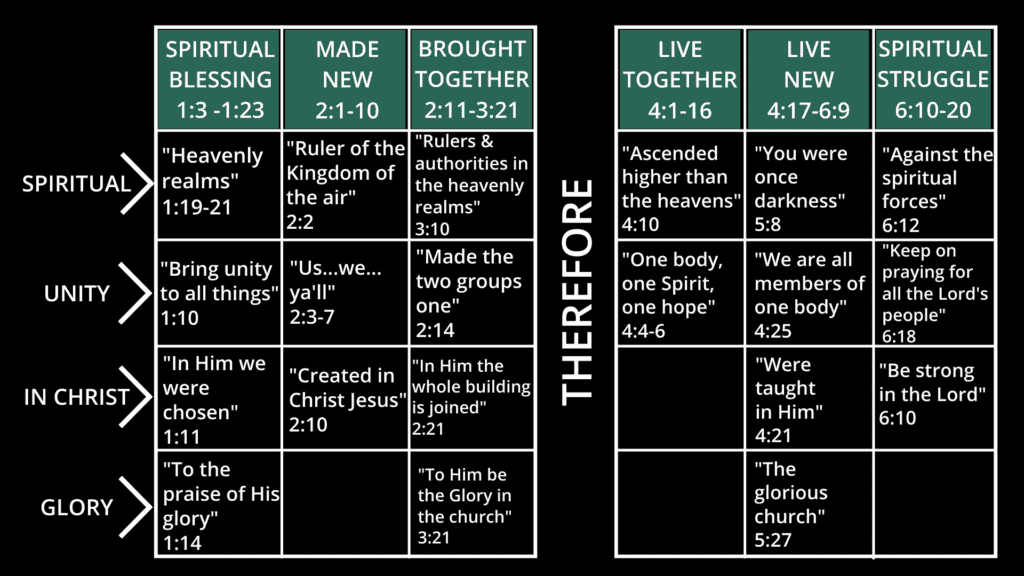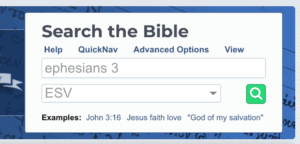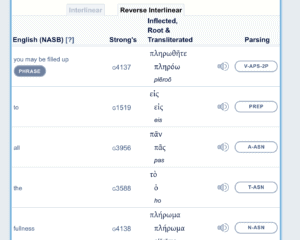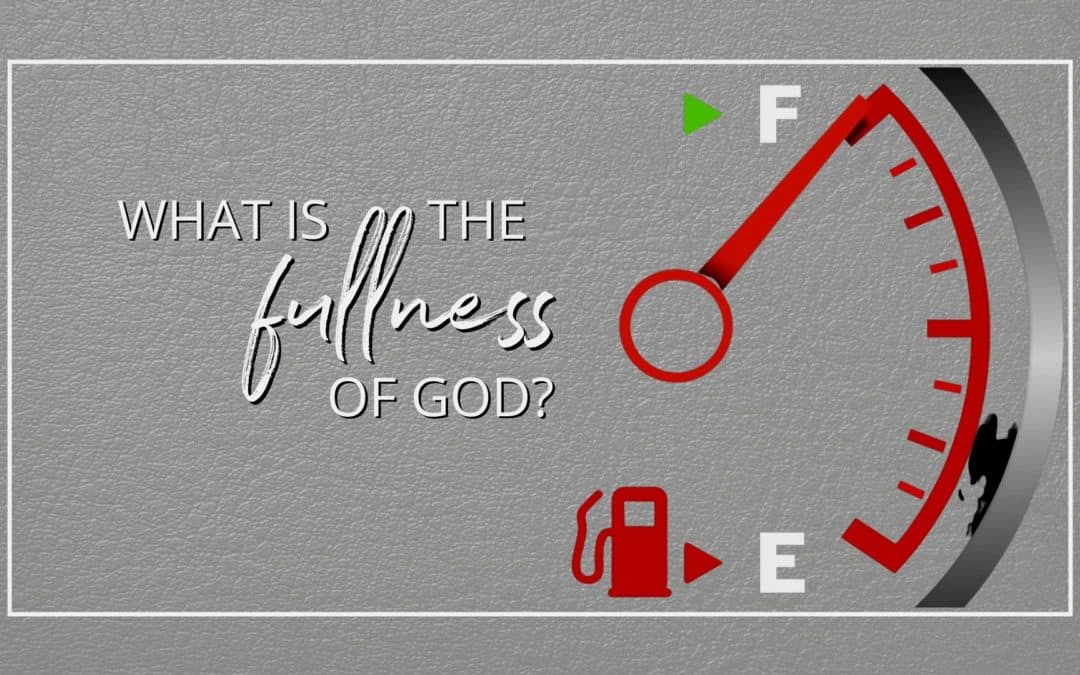How good it is to be reading in Ephesians this week? It’s encouraging to sit in and ponder these deep and rich truths we’ve been considering for the past few months in the sermon series! In this post, we’re going to learn some study Bible skills and dive into a specific phrase in the book of Ephesians.
Hopefully, the first sermon in our current series, preached by Pastor Justin, has helped give some valuable context and insight into the chapters. If you don’t remember, here’s the helpful overview chart he provided for us:

In particular, the reminder that Ephesians is a book about spiritual warfare and the realities of spiritual truths has been profound!
On Thursday, we read Ephesians 3, which finishes with a well know benediction – a prayer of blessing that can often be used for commission. It says, in effect, “This is how you’re to go and now live!” Many of Woodlands’ services end with a prayer of benediction, sounding something like, “Lord, since you’ve taught us today about _____, help us to live that way throughout our week!” It’s a reminder that what God does on Sunday should adjust, reorient, and affect how we live through the week.
In Paul’s case, he prays that the church would be able to comprehend the vast love of God (3:18), after having been strengthened (3:16), indwelt by Christ (3:17), and “rooted and established in love” (3:17). And all of this comes to a culmination as Paul asks that the church would, “know Christ’s love that surpasses knowledge, so that you may be filled with all the fullness of God.”
It’s that final phrase that might make you double-take if you’re reading this passage slowly and ponderously. What does Paul mean when he prays that a knowledge of Christ’s love would lead to the church being filled – filled with what? Filled by what? Filled with all the fullness of God.
Isn’t that a strange, redundant phrase? Why would he repeat himself like that: “filled with” and “fullness?”
Let’s Study!
And if that language gives you pause – that’s a wonderful Bible-study moment. Questions like that give time and space for study and contemplation. So, let’s look at how one might go about attempting to answer this with some simple Bible Study tools.

First, because the question centers around language, perhaps the original Greek might give some insight. After all, maybe those words weren’t quite as redundant for Paul as they are for us? So, a wonderful tool at your disposal is the Blue Letter Bible (blueletterbible.org). After navigating to that site, you’ll simply enter your text in the search bar, choose your translation, and perform the search:
 Once you’re in Ephesians 3, scroll down to verse 19, and click “tools” next to the verse. Immediately, you’ll see a list of all the Greek words and their translations (you’ll want to use the “Reverse Interlinear” option – this means you’re seeing the Greek works listed in-line with their English counterparts).
Once you’re in Ephesians 3, scroll down to verse 19, and click “tools” next to the verse. Immediately, you’ll see a list of all the Greek words and their translations (you’ll want to use the “Reverse Interlinear” option – this means you’re seeing the Greek works listed in-line with their English counterparts).
You don’t need to read Greek! But you can see the Greek form of the word translated, “you may be filled” and “fullness.” Compare the Greek characters – what do you see?
That’s right – the two words have the same root. There isn’t any ‘lost-in-translation’ original language mixup here – Paul is using seemingly-redundant phrases in this verse.
Taking It a Step Further
So the next option might be to explore the words a little more and see if there isn’t anything broader going on with the phrases Paul has used. “The fullness of God,” is an interesting phrase, so let’s see if that’s used anywhere else to mean anything.
Back to the Blue Letter Bible listing, you’ll notice that between each English word in the verse and the Greek Interlinear there’s a number listed as “Strong’s.” This refers to Strong’s Exhaustive Concordance, a list of every instance of every word used in the Bible. Luckily, Blue Letter Bible has made it easy to reference. If you click on the Strong’s number next to the word, “fullness” (G4138), you’ll be brought to a possibly overwhelming page. But don’t give up, and don’t get caught up in what you don’t understand. Instead, scroll down until you reach the section titled “Concordance Results Shown Using the ESV.”
![]()
You’ll notice there are 17 times the Greek word πλήρωμα shows up in the New Testament, and the very first instance – Matthew 9:16 – doesn’t even use the English word fullness! Don’t get caught up there, though – we’re looking for the phrase, “the fullness of God.” Keep scrolling through the list, and you’ll see Paul uses that phrase a fair number of times. Romans 15:29, Paul says he “will come in the fullness of the blessing of Christ.” And in Colossians 1:29, Paul says that in Christ, “all the fullness of God was pleased to dwell.”
But it seems to be the four references in Ephesians that we should pay attention to. The first use, Ephesians 1:10, refers to the “fullness of time,” so it doesn’t seem to apply. But the next three are interesting. The first reference is Ephesians 1:23, and it says that God, “appointed [Jesus] as head over everything to the church, which is [Jesus’] body, the fullness of the one who fills all in all.” Here, as in Ephesians 3:19, we have the “fullness of God” language, as well as the use of the word “all.” But “fullness of God” is defined! It’s defined as the church.
The third use is the one we’re considering, in Ephesians 3:19, so let’s look at the fourth. There too, Paul is speaking about participation in the church. He says that God has given gifts to the church, “for building up the body of Christ… to the measure of the stature of the fullness of Christ.” Do you see the parallel?
In Ephesians, Paul seems to be referring to Christ’s body here on earth – the church – as “the fullness of Him who fills all.” Compare this grand vision to Pastor Justin’s summary of the themes in Ephesians, and you’ll see it matches well. Unity, glory, purpose, value, and vision for the church are all captured.
Tying It All Together
It seems that an appropriate understanding of the concept of the “fullness of Christ,” might be, “so that you may participate fully in the body of Christ – as God intends.” And so then let’s take that concept, and apply it to our confusing phrase in Ephesians 3 – Paul’s prayer of benediction:
“For this reason, I bow my knees before the Father… that Christ may dwell in your hearts through faith—that you, being rooted and grounded in love, may have strength to comprehend with all the saints what is the breadth and length and height and depth, and to know the love of Christ that surpasses knowledge, that you may be full participants in the church – in the Body of Christ – just as God intends.“
Wow. What a vision for the church, and what a call for us to consider what it means to be part of the church. What a picture Paul is painting!
– – – – – – – –
What do you think? Did you learn anything about studying the Bible? Do you agree – or disagree – with the sentiments? We’d love to learn together – leave a comment below! As always, we’d love for you to read along with us in Woodlands in the Word! Text BIBLE to 888-225-7675 for a link to each weekday’s Bible reading and prayer prompts.


Great Word for Word analysis..Would it not solidify the study if we found a second witness to “Participating in the Church”. How would we relate the phrase to Partakers of the Divine Nature in 2Pet.1:4..